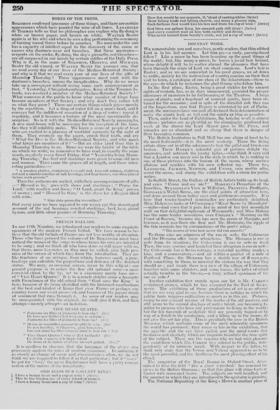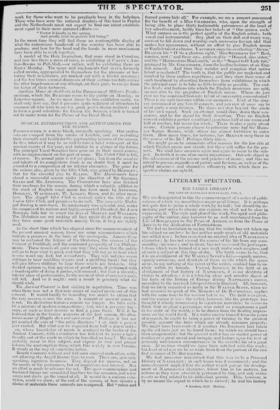HOLYDAY WORK.
WE congratulate you and ourselves, gentle readers, that thin-ribbed Lent is in his last agonies. Let him go,—a surly, parsnip-faced fellow ! Like a miser he has been hoarding up the good things of the world ; but, like many a miser, he leaves a jovial heir behind, whose delight it will be to scatter abroad the pleasures that have been through the reign of Lent on short commons. Lent's heir is Easter ; and as we are somewhat in his good graces, we sit down to indite, mainly for the instruction of country cousins on their first visit to town, a catalogue of one class of the delectations—those to the eye—to which he welcomes the glad throng who follow him. In the first place, Easter, being a great stickler for the ancient rights of custom, has, as in clays immemorial, provided the proper allowance of monsters to be forthcoming at the Theatres. A. large cargo of giants, and a hogshead of comical spirits, have been ob- tained for the occasion ; and in spite of the dreadful risk they run of the Inquisition, now that Popery is reinstated by act of Parlia- ment, the managers have one and all declared their determination of make the giants look as tall and the spirits as blue as possible.
Then, under the head of Exhibitions, the holyday work is almost endless : pictures are as plentiful as the champagne produced last week at the dinner the Lord Mayor gave to Mr. PEEL„ and miracles are so abundant and so cheap that there is danger of their becoming common.
The British Institution in Pall Mall has one claim at least to be the most fashionable—it is the most westerly. There the living artists shine out in all the adornments that the pallet and brush can bestow. There DANBY'S splendid pair of pictures delight the amateurs, and astonish the young ladies,—who think it very odd that a London sun never sets in the style in which he is sinking in one of these pictures into the bosom of the ocean, whose surface gliStens and sparkles with his own reflected ray. There too, LANDSEER, JACKSON, NEWTON, and UWINS, CUM muftis alias, assist the scene, and stamp the exhibition with a claim for public notice.
In Suffolk Street, the Gallery of British Artists holds up its head,
and cries " Come and see me !" ROBERTS'S Departure of the Israelites, STANFIELD'S View in WiliShire, PRENTIS'S Profligate, Goopanis Welsh Scene, are the chief points of attraction here, and draw around them Inches' eyes and g,entlemen's remarks. It is here that tender-hearted demoiselles are particularly delighted. Miss Molyneux looks at O'CoNsanis "River Scene by Moonlight" —sighs—and vows that it puts lier in mind of her last moonlieht walk on that delightful esplanade at -Weymouth; aml Miss Malony has the same tender sensations over CRUDE'S " Morning on the Coast of Sussex," because she has seen the ocean at Margate, and because, as it was there she first met Mr. Moorgate, the ripple of the tide reminds her by circumstance of the poets adage,
" The course of true love never did run smooth."
To those who are admirers of the rus it urbe, the Colosseum and the Diorama offer large attractions. The Diorama is lets in urbe from its situation ; the Colosseum is rus in urbe in itself. Then, the very essence and kernel of their attraction is rim in urbe: the Colosseum has a Swiss cottage, a waterfall (getting ready), a lake, and a conservatory,—and all within a quarter of a mile of Portland Place : the Diorama has a double row of flower-pots, with something in them, to marshal the visitors the way that they should go and inside there is a view of the village of Unterseen, together with some cloisters, and sonic leaves, the latter of which actually tremble in the breeze,—a truly refined specimen of the ries in 'trim I
Another exhibition that stands upon our list is Mr. Cmsens's
sculptured groups, which he has executed for the Earl of EGRE- MONT. The exhibiting of these productions of art is an attempt that we are very giad to see, because there is nothing in which the public taste requires cultivation so much as in this art. Pictures. owing to our gradual muster of the works of the old masters, and still more to 1 he annual displays of native talent, are becoming fa- miliar to persons who have any pretensions to living in the world ; but the few fag-ends of sculpture that are generally tagged OR by way of a finish to the catalogues, and a -Ming up to the rooms, do not give this art fair play. This is peculiarly the ease in the British Museum, which contains some of the most admirable specimens the world has produced : they conic so late in the exhibition, that the appetite and the eye have palled, and the mind wants 111;11 freshness and elasticity which are requisite to imbibe the true spirit of the subject. These are the reasons why we hail with pleasure the exhibition which iMr. CARF,W has OtrerCd to the public, nets- pendently of its intrinsic merit. With respect to the latter, we shall only state that the Venus and Vulcan appeared to us to be the most powerful, and the Arethusa the most pleesiug effort of his chisel.
The proprietor of the Royal Bazaar in Oxford Street, deter- mined to take the field " like a giant refreshed," has renewed his views in the British Diorama ; so that this place will shine forth at Easter with renovated lustre. The subjects arc well handled, and the manner in which they are introduced to the spectator is pleasing.
The National Repository at the King's Mews is another piece of work for those who want to be peculiarly busy in the holydays. Those who have seen the national displays of this kind in France and the Netherlands must not expect to find our infant establish- ment equal to their more matured efforts :-
" Foster it kindly in the spring, And goodly fruit its growth will bring."
In the mean time they will find there no contemptible display of what the industrious handicraft of the country has been able to produce, and how far the head and the hands in mere mechanism have been able to work together.
A model of the Holy Inquisition, that once stood in Coimbra, and now lies there a mass of ruins, is exhibiting at ( 'AUTY'S Auc- tion-Rooms in Pall-Mall,—or rather, will be exhibiting there on Easter Monday. The space and implements that devils, formerly called monks, appropriated to themselves fur the pleasure of tor- turing their neighbours, arc marked out with a fearful accuracy; and the ten times secured dungeons of their victims too fully eviuce the utter hopelessness of any attempt, on their part, to escape from the fangs of their torturers.
Another Masse de diablerie, is the Panorama of Milton's Pande- monium, which Mr. BURFORD opens to time public on Monday, in Leicester-square. As we must recur to this exhibition again, we shall only here say, that it presents quite sufficient of attraction to summon all who wish to see the great poet's dream realized; and to form a good substitute for Genoa the Superb, which is turned out to make room for the Palace of the Great Devil.



















 Previous page
Previous page